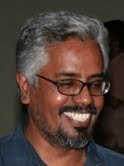Raoul Peck

RAOUL PECK – FROM AFRICA TO THE WORLD AND BACK
C S Venkiteswaran
“I am not interested in avant-gardist narrative form, but rather in ideological deconstruction. The idea is by multiplying angles and superposing layers of narrative, you can create a different perception, closer to reality. I advance step by step, trying all possible combinations.”
The Haitian filmmaker Raoul Peck’s oeuvre deals with some of the most troubling questions of contemporary Third World politics and life: the exploitation under the new global economic order, lack of visionary leadership within and fragmentation of the socio-political fabric, and the haunting memories and the harrowing present of diasporic life. All these themes recur in Peck films, though they are set in various milieu, cultures and nations.
The life of Raoul Peck also traverses a very curious path. Born in Haiti, his parents fled the Duvalier dictatorship when he was 8, and found asylum and a new life in the recently independent Republic of Congo. He was educated in Haiti, Zaire (Congo) and later studied engineering and economics at Berlin University, worked as a journalist and photographer from 1980 to 1985, and received his film degree from the Berlin Academy of Film and Television in 1988. For a brief period, he was also the Minister of Culture in Haiti. His oeuvre includes short experimental works, political documentaries and features. His first feature film feature The Man by the Shore (1993) was nominated for the Golden Palm at Cannes in 1993. His later films, Lumumba: Death of a Prophet (1992) and The Man By The Shore (1993), Lumumba (2000) Moloch Tropical (2009) etc have received international acclaim.

It was indeed a very strange journey for an African filmmaker like Raoul Peck, who is always haunted by his roots and frustrated by its historical trajectories. For Peck, it has always been a struggle of discovery and reinterpretation. Though his films have been consistently criticized by his opponents for its ‘partisan’ views, he has never relented. Film after film, he has dug into the very roots of the condition of Africa today. Haitian Corner, the film which first drew international attention to him, is about a Haitian in New York who, like his parents fled Haiti during the Duvalier dictatorship. One day in the street the protagonist thinks he recognises someone who tortured him and from then on, he is obsessed with the idea of revenge. It is a film about the conditions to which the dispossessed are driven. In The Man by the Shore Raoul Peck takes up the complex relationship between the victim and torturer, and the diabolic dimensions of violence in sociopolitical life. His most well known film is on Lumumba, first a documentary and then a feature, which chronicles the events surrounding the leader’s assassination - an event that shattered of the great hope of African unity and self-determination. It has been hailed as a heartwrenching film both for cinematic and political reasons, as it depicts a visionary leader caught in the crossfire of colonial economic interests on the one side and African ethnic intrigues on the other.

In Desounen: Dialogue with Death, is a fantastic dialogue between Death and a peasant, interspersed with interviews with Haitians from different walks of life. Formally, this film uses an open, dialogic format where fantasy and reportage converge. Sometimes in April, another landmark film, deals with the traumatic events surrounding the massacre in Rwanda, the fatal procrastination of justice and the criminal indifference of the international community. Raoul Peck's most recent work Moloch Tropical is an clinical examination about the workings of the mind of a tyrant, ruler of a country but ultimately a petty human being caught between personal-psychological and global-political forces. His documentaries also have probed the same themes incisively. His Profit and Nothing But! is about another dictatorship - that of global capital that has devastated "developing nations" like Haiti. In Haiti, Silence of the Dogs, he returns to the theme of political intrigues and the eventual betrayal of the people.
Labels: raoul peck


0 Comments:
Post a Comment
Subscribe to Post Comments [Atom]
<< Home